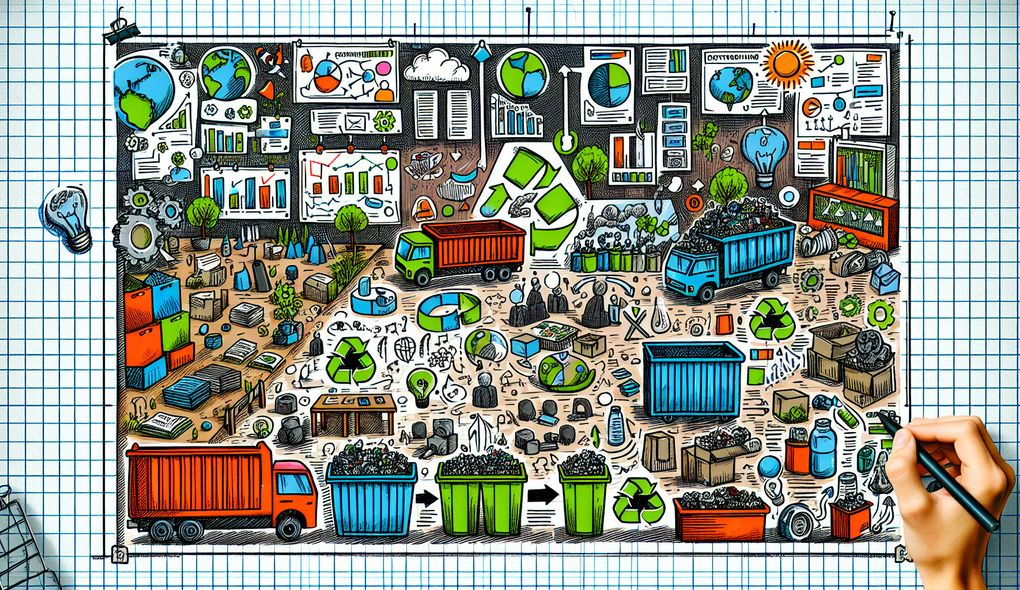What steps do you take to ensure regulatory compliance in waste management practices?
SENIOR LEVEL

Sample answer to the question:
To ensure regulatory compliance in waste management practices, I take several key steps. Firstly, I stay up to date with local, state, and federal environmental regulations and guidelines. This allows me to understand the legal requirements and make sure our waste management practices align with them. Secondly, I conduct regular audits and inspections to identify any potential compliance issues and address them promptly. Additionally, I work closely with government agencies and waste service providers to ensure we are following the best practices and guidelines. Finally, I keep track of changes in legislation and industry standards to ensure our policies and practices remain relevant and compliant.
Here is a more solid answer:
Ensuring regulatory compliance in waste management practices requires a multifaceted approach. Firstly, I stay abreast of local, state, and federal environmental regulations and guidelines to understand the legal requirements we need to meet. For example, in my previous role as a waste management coordinator, I regularly reviewed the Environmental Protection Agency's regulations to ensure our waste management practices complied with them. Secondly, I implement rigorous audit and inspection procedures to identify any potential non-compliance issues. This includes conducting regular on-site inspections, maintaining detailed records, and addressing any findings promptly. In one instance, during an audit, I discovered a minor non-compliance issue and immediately implemented corrective actions to rectify it. Thirdly, I prioritize extensive stakeholder coordination to ensure compliance across all levels. This involves working closely with government agencies, waste service providers, and community groups to align our practices with regulatory requirements. Lastly, I actively monitor changes in legislation and industry standards to ensure our policies and practices remain up to date. This includes attending industry conferences, subscribing to regulatory update newsletters, and participating in professional development opportunities. By proactively staying informed, I can anticipate regulatory changes and adjust our waste management practices accordingly.
Why is this a more solid answer?
The solid answer provides more specific details and examples of previous experience and projects related to regulatory compliance in waste management practices. It demonstrates a deeper understanding of the evaluation areas and highlights the candidate's active engagement in regulatory compliance efforts. However, it could still benefit from further elaboration and more specific examples to make the response even more comprehensive.
An example of a exceptional answer:
Ensuring regulatory compliance in waste management practices is a top priority that requires meticulous attention to detail and proactive measures. To achieve this, I follow a comprehensive approach involving several key steps. Firstly, I stay up to date with local, state, and federal environmental regulations and guidelines, constantly monitoring any changes or updates. This includes attending regulatory training sessions, participating in industry forums, and engaging with regulatory agencies. For instance, in my previous role as a Waste Compliance Manager, I successfully obtained a certification in environmental law, enhancing my knowledge of regulatory compliance. Secondly, I develop and implement comprehensive audit and inspection protocols to regularly assess our waste management practices' compliance. This involves conducting thorough on-site inspections, reviewing documentation and records, and addressing any non-compliance issues promptly. In one notable instance, I identified a compliance gap during an inspection and initiated a corrective action plan, resulting in full compliance within a month. Thirdly, I prioritize stakeholder coordination and engagement to ensure all parties involved are aligned with regulatory requirements. This includes collaborating closely with government agencies, waste service providers, community groups, and internal departments to develop and implement effective waste management strategies. As a waste management consultant, I facilitated a series of workshops and meetings with diverse stakeholders to educate them about regulatory compliance and solicit their input in developing sustainable waste management programs. Finally, I actively monitor changes in legislation and industry standards by subscribing to regulatory update newsletters, attending conferences and seminars, and participating in professional associations. This enables me to anticipate regulatory changes and adapt our waste management practices proactively. For example, I spearheaded the implementation of a new waste tracking system in response to new state reporting requirements, streamlining our compliance processes. In summary, my comprehensive approach to regulatory compliance in waste management practices combines ongoing education, rigorous audits, stakeholder collaboration, and proactive monitoring to ensure the highest level of compliance and environmental protection.
Why is this an exceptional answer?
The exceptional answer demonstrates a thorough understanding of the evaluation areas and provides specific examples and projects related to regulatory compliance in waste management practices. The candidate's proactive measures, such as obtaining a certification in environmental law and spearheading the implementation of a new waste tracking system, showcase their commitment to regulatory compliance and continuous improvement. The response is comprehensive and provides a clear overview of the candidate's expertise and experience in waste management compliance.
How to prepare for this question:
- Familiarize yourself with local, state, and federal environmental regulations and guidelines, emphasizing waste management-related requirements.
- Stay informed about the latest regulatory changes and updates by attending industry conferences, subscribing to regulatory update newsletters, and participating in professional associations.
- Develop comprehensive audit and inspection procedures to assess compliance with waste management regulations.
- Highlight your experience in stakeholder coordination and engagement, as regulatory compliance often involves collaboration with various parties.
- Provide specific examples from your past experience and projects that demonstrate your knowledge and success in ensuring regulatory compliance.
- Demonstrate your commitment to continuous improvement by showcasing any certifications or additional training you have obtained in environmental law or waste management regulations.
What are interviewers evaluating with this question?
- Regulatory compliance knowledge
- Audit and inspection
- Stakeholder coordination
- Legislation and industry standards monitoring

